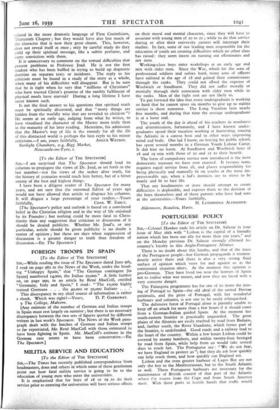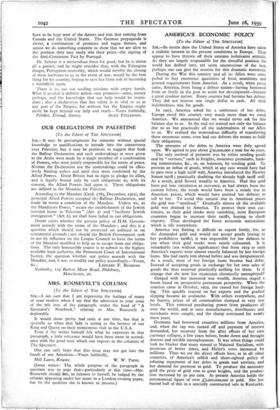PORTUGUESE POLICY [To the Editor of THE SPECTATOR]
Sta,—Colonel Hawkes ends his article on Dr. Salazar in your issue of May 26th with " Lisbon is the capital of a friendly nation which has been our ally for more than 50o years," and on the Monday previous Dr. Salazar strongly affirmed his country's loyalty to this Anglo-Portuguese Alliance.
There is no doubt about this loyalty, and that of the mass of the Portuguese people—but German propaganda is tremen- dously active there and there is also a very strong fluid surface of opinion which veers for and against us as the continental situation alters. At the moment this opinion is pro-German. They have lived too near the horrors of Spain not to realise what war means, and now they are faced with a very concrete danger.
The Falangista programme has for one of its items the join- ing of Portugal to Spain—the old ideal of the united Iberian peninsula, and the prize of Portugal, with her wonderful harbours and colonies, is not one to be easily relinquished.
The defensive force of Portugal alone is patently unable to keep off an attack for more than a few hours if it should come from a German-Italian guided Spain. At the moment her south-eastern frontier is practically unguarded. The great plains of the Alentejo are easily reached by road from Badajos, and, farther south, the River Guadiana, which forms part of the frontier, is undefended. Good roads and a railway lead to the heart of the country. Within a few hours Lisbon could be covered by enemy bombers, and within twenty-four besieged by road from Spain, while help from us would take several days to reach her. The Portuguese say: "We do not fear, we have England to protect us "; but they do ask how quickly can help reach them, and how quickly can England act.
Lisbon and the even greater harbour of Lagos Bay are not only the key to the Mediterranean, but to the South Atlantic as well. These Portuguese harbours are necessary for the maintenance of British control of that part of the Atlantic where the routes from the Cape and from South America meet. With these ports in hostile hands that traffic would
have to be kept west of the Azores and join that coming from Canada and the United States. The German propaganda is clever, a combination of promises and vague threats, and unless we do something concrete to show that we are alive to the position they may easily win their point—the signing of the Anti-Comintern Pact by Portugal.
Dr. Salazar is a tremendous force for good, but he is above all a patriot, and he might consider that, with the Falangista danger, Portuguese neutrality, which would involve the closing of these harbours to us in the event of war, would be the best thing for his country, hoping to save her from risk of becoming a battlefield again.
There is no use our sending missions with empty hands. What is needed is definite action—not promises—arms, money perhaps, and the knowledge that our help would be imme- diate ; also a declaration that her safety is as vital to us as any part of the Empire, for without her the Empire might easily be kept beyond our help and reach.—Yours faithfully,























































 Previous page
Previous page